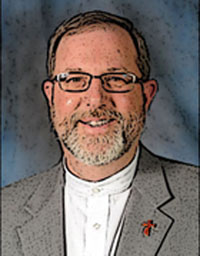Justice Perspective: Civil discourse and human dignity
by DEACON DON WEIGEL
A few weeks ago, the second reading at Mass contained these lines from the letter to the Ephesians: "All bitterness, fury, anger, shouting, and reviling must be removed from you, along with all malice. And be kind to one another, compassionate, forgiving one another as God has forgiven you in Christ."
It may be easy to understand how fury, anger, shouting and the rest are not qualities befitting a disciple of Jesus, but the positive actions of kindness, compassion and forgiveness sometimes slip out of our behavior - especially in how we talk, and even more especially in our political conversations.
The presidential election cycle has already begun, and even now we are seeing candidates and supporters of candidates who do not seem to have any reluctance in saying things that are offensive, crude or downright repulsive. Somehow this speech is excused as being truthful or honest, but it is more likely that it is rather filled with "bitterness, fury, anger, shouting and reviling."
The problem is that such talk is contrary to the most basic principle of Catholic social teaching: Respect for the dignity of every human being. How can we ever hope to become a nation of people who respect the dignity of each person in our actions if we cannot even do so in our speech? How can we respect the dignity of people half a world away if we cannot be civil to those right in front of us? What has happened to civility in our social, political and even religious lives?
Civility must mean more than just being polite, otherwise we could just pardon ourselves as we said demeaning and insulting things to one another. And it does not mean that we cannot have strong opinions about topics; but it does mean that we need to separate the person from the issue. Civility also means that we have to strive for fairness in our conversations and be open-minded enough to consider that the other person might, in fact, persuade us.
Those of us who are on any social media websites such as Facebook or blogs know that sometimes comments very quickly become heated, angry and even offensive. Even in conversation with others around our dinner table or around the "water cooler" at work we sometimes find ourselves caught in an opportunity to be bitter, angry or insulting. How are we to respond when others unleash such vile language our way?
One alternative is to practice what is known as "non-violent communication" as founded by Dr. Marshall Rosenburg. It is a form of discussion with an emphasis on deep listening - to ourselves as well as others - and helps us discover the depth of our own compassion. This language reveals the awareness that all human beings are only trying to honor universal values and needs, every minute, every day. There are books and courses available on this empathic listening style that is designed to enhance relationships rather than win arguments.
Another approach is to follow the "Pledge for Civil Discourse" by the Franciscan Action Network. Designed to promote peace and non-violence in communication, it suggests that we look at dialogue as a way to gain new insight and understanding. It encourages us to respect the dignity of others who hold opposing views, to identify common ground, and to reduce heated words by assuming that even those with whom we differ are acting in good faith.
To a great extent, we have become a mean and rude society. As disciples of Jesus, we are called to a higher standard - to not only act, but to speak in a way that enhances the dignity of others.
Deacon Don Weigel is the associate public policy coordinator at Catholic Charities of Buffalo and is a Global Fellow with Catholic Relief Services. He may be reached at deacondon@gmail.com.




